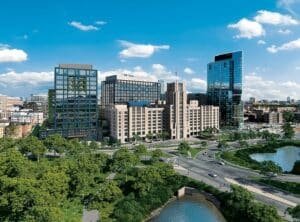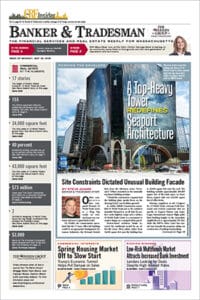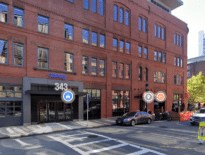
421 Park Drive, left, is at the Alexandria Center for Life Science in Boston's Fenway neighborhood. Photo courtesy of Alexandria Real Estate Equities
Alexandria Real Estate Equities is bracing for a double-digit increase in costs on its current development pipeline related to the Trump administration’s tariff policies and inflation.
Alexandria, the nation’s largest life science developer, on Tuesday reported a net loss of $11.6 million in the first quarter.
While the developer has been scaling back its new development to reflect the life science slump, it had approximately $1.3 billion in costs for current projects not yet under contract at the end of the first quarter. A 10 percent increase in materials costs would translate in up to $50 million in additional project costs, Alexandria estimated in its first-quarter earnings statement.
Executives said tariffs will increase short-term building costs, but potentially create opportunities for the U.S. to capture a larger share of the global life science industry.
“Whatever anybody thinks of the president and the current administration, one thing is true: these people are not totally stupid, and they are focused on preserving and protecting this industry, which is one of the few remaining crown jewel industries,” Alexandria Executive Chairman Joel Marcus said during a conference call with analysts.
The company has been offloading assets and pulling back on new development, selling $9.6 billion worth of real estate since 2019 in response to the steep dropoff in demand for lab space. One major local project is still under way in the Fenway, where Alexandria is developing a 660,000 square-foot life science building at 421 Park Drive.
The only announced occupant, Boston Children’s Hospital, has paused its plans to acquire 268,000 square feet within the building for research space, according to a Boston Business Journal report. The building broke ground in 2023.
Uncertainty created by the Trump administration’s changing tariff policies, cuts to National Institutes for Health research grants and Federal Reserve interest rate policy are creating additional headwinds for an industry that has been battered by declines in private investment.
In Greater Boston, the lab market now has a 25 percent availability rate, CBRE reported.
Alexandria owns nearly 40 million square feet of life science properties in industry clusters, including 11.5 million square feet in Greater Boston. The local inventory represents 36 percent of Alexandria’s overall rental revenue.
Alexandria’s Greater Boston operating properties had a 91.8 percent occupancy rate at the end of the first quarter, down from 94.8 percent at the end of 2024.
Tariffs could translate into growth of biomanufacturing in established markets such as the Research Triangle in North Carolina, said Hallie Kuhn, Alexandria’s senior vice president of life science and capital markets.
Marcus said the cumulative effects of the Trump administration’s policies on industry executives’ decision-making are hard to gauge thus far, but said trade protectionism could provide benefits.
“When it comes to things like the tariffs, they’re really trying to put tariffs and making a distinction between materials coming from friendly countries and unfriendly countries,” Marcus said. “And what they want to do is bring supply lines back to the U.S. or to safer locations, and I think that’s going to benefit this industry greatly.”








